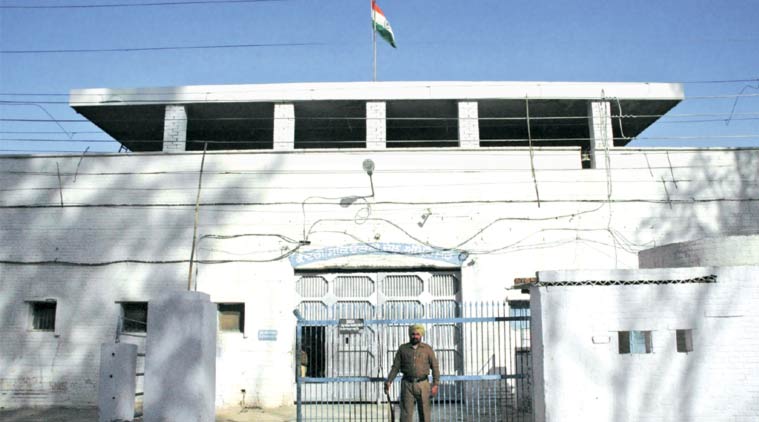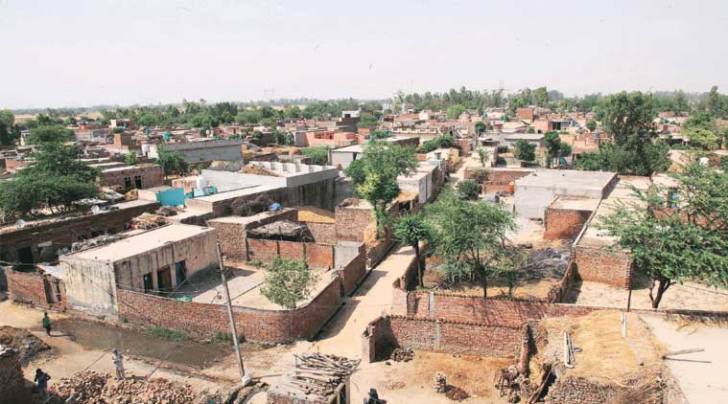- India
- International
Punjab’s war on drugs: Untold toll, one death in custody every four days
Scrutiny of FIRs in the most affected districts by The Indian Express reveals an average of over 25 addicts being booked each day
 In 2014, 6 held under NDPS Act died in Amritsar jail. (Express Photo)
In 2014, 6 held under NDPS Act died in Amritsar jail. (Express Photo)Scrutiny of FIRs in the most affected districts by The Indian Express reveals an average of over 25 addicts being booked each day — in effect, dragging 25 families into a broken penal system. At least 174 individuals charged under the Narcotic Drugs and Psychotropic Substance (NDPS) Act have died in prisons — 88 in 2014 and 86 in 2015.
There is at least one man or woman dying in custody, either in a police station or a prison, every four days over the last two years — that’s the staggering human and social cost of Punjab’s skewed crackdown on drugs.
This is the finding of an investigation by The Indian Express of data obtained under the Right to Information Act and analysis of police and jail records.
If the targets are drug addicts rather than those who supply them, such numbers may be startling but hardly come as a surprise.
Scrutiny of FIRs in the most affected districts by The Indian Express reveals an average of over 25 addicts being booked each day — in effect, dragging 25 families into a broken penal system.

READ | Punjab’s war on drugs: The living and the dead
So inadequate is this system — both police stations and prisons — to deal with the addicts’ challenging physiological and psychological symptoms and illnesses, that death in custody has assumed an alarming frequency.
At least 174 individuals charged under the Narcotic Drugs and Psychotropic Substance (NDPS) Act have died in prisons — 88 in 2014 and 86 in 2015.
[related-post]
Watch Video: What’s making news
These numbers aren’t improving any time soon.
For, an analysis of figures available until April 30 this year show that those charged under the NDPS Act constitute as high as 40 per cent of the 22,691 men and women lodged in prisons that are overcrowded, awash in narcotic substances and medically ill-equipped to handle addicts.
Take the case of 45-year-old Tarun Kumar who was arrested from his house in Bara Pind village in Jalandhar on the evening of April 17, 2015.
The next day, Kumar was charged, according to his FIR, with possession of 330 g of “drug powder’. A month later, he was found hanging inside his cell in Kapurthala jail. Jail officials said he had committed suicide because he could not endure the withdrawal symptoms.
Read our full coverage here of the Express investigation
What they do not say was that the jail had no one to help Kumar fight those symptoms.
“Whenever I used to meet him in jail, he used to be worried about what his two grown-up sons think of their father being an addict,” said Kumar’s wife, Ritu Sharma, adding that her husband could not bear the shame of arrest.
Now consider what happened to 38-year-old Surjeet Singh, who was arrested in Moga on October 18, 2014. He was charged with possessing 500 g of “white powder”. On the intervening night of December 1-2, 2014, police informed his family that he had committed suicide.
“I had met him on November 28 in Faridkot jail and he was fine. He was not suffering from any illness or depression. He was a strong man. It is hard to believe that he could have committed suicide,” said Surjeet’s wife, Paramjeet Kaur.
Shashi Kant, former Director General of Police (Prisons), Punjab, says addicts should never be sent to jails but instead be rehabilitated in de-addiction centres.

“Even if you go by the definition of a drug addict, it means a person suffering from mental or psychological disease and nothing beyond that. Unfortunately, in our society, there is as such a social stigma attached to an addict. If you send him to jail, his life gets destroyed. These addicts should be sent to de-addiction centres and not to jails, a practice that most of the countries across the world are following,” he said.
Top prison officials claim that most of the deaths of those held under the NDPS Act were due to “chronic ailments.”
But the case of Amritsar jail stands out in stark contrast.
It was the first prison in the state to get an exclusive drug de-addiction centre in 2012. And yet, in an indication of the scale of the challenge, this was also the jail where in 2014, 30 men held under the NDPS Act died — the most for any Punjab prison that year.
Also read: At Ground Zero, behind each door, a broken home
And according to figures obtained by The Indian Express until April this year, the jail, which can house 1,665 prisoners, was packed with 3,238 inmates of whom 1,232 were involved only in drug cases.
“Our de-addiction centre started with 25 beds. But we had to expand our capacity to more than 400 after the government launched the drive against drug peddlers in 2014. Most of the peddlers were drug addicts,” said Dr Amritpal Singh Nibber, who launched the de-addiction centre in the jail, and is now medical officer at Khadoor Sahib Civil Hospital.
According to official sources, the de-addiction centre started with a doctor trained to treat addicts, and a psychiatrist.
 Boot is the veritable Ground Zero of addiction with 47 FIRs registered under the NDPS Act in one year, the most from a single village in Punjab, according to records accessed by The Indian Express. (Express Photo: Jaipal Singh)
Boot is the veritable Ground Zero of addiction with 47 FIRs registered under the NDPS Act in one year, the most from a single village in Punjab, according to records accessed by The Indian Express. (Express Photo: Jaipal Singh)
Today, the psychiatrist’s post is vacant — one from the civil hospital visits twice a week — and there is no full-time doctor.
A doctor from the understaffed hospital jail — it has only three doctors instead of the allotted five — holds charge of the centre.
Besides, the centre has no male nurse, ward attendant or other paramedical staff. Sources said that often, prisoners admitted to the centre are asked to fill in for these jobs.
“We normally get new prisoners as patients. Around 75 per cent of them are drug users of which at least 90 per cent are addicted to heroin. We admit such patients for a 21-day course before enrolling new ones. This circle goes on,” said Dr Simrandeep Singh, in charge of the clinic.
Also read: Punjab’s war on drugs is more a war on drug addicts
In Punjab’s eight central jails, each de-addiction centre comprises one barrack for detoxification, and a second for rehabilitation. Government doctors who work at these centres say they use a “multi-pronged treatment approach” that includes religious sermons, meditation, yoga and indoor games.
Dr Sandeep Bhola, psychiatrist at the civil hospital in Kapurthala, who consults at the de-addiction centre in the local jail, says 80 to 90 cases receive treatment in prison at any given time.
Recently, 100 inmates, mostly addicts, were screened for depression of whom seven were found to have suicidal tendencies. Sources in Kapurthala jail said the rehabilitation barrack usually houses 150-200 patients. Officials at the jail, with 2,870 total inmates, say around 40 per cent of the new admissions are addicts.
The other major pitfall awaiting addicts in jail, said experts, is the easy availability of drugs inside. On May 9, a raid inside Kapurthala jail yielded 308 syringes.
“The availability of drugs inside Punjab’s jails is an open secret. A de-addiction centre is useless so long as drugs are easily available inside. Who were using those syringes in Kapurthala jail?” said a state health department official, on condition of anonymity.
When contacted, L S Jakhar, Deputy Inspector General (Jails) blamed the deaths of addicts in jail on chronic ailments.
“Many times, the drug cases accused who land in jails are already suffering from chronic diseases like hepatitis, heart ailment and other diseases due to drug use. The deaths are primarily due to chronic diseases they acquire while doing drugs. No deaths in jail have taken place due to any other reasons,” he said.
 Please save my daughter, she did no wrong: Jeet Kaur in Boot village, her daughter is in prison for possession. (Express Photo by Jaipal Singh)
Please save my daughter, she did no wrong: Jeet Kaur in Boot village, her daughter is in prison for possession. (Express Photo by Jaipal Singh)
Jakhar said that jail officials “keep a constant tab on the movement of inmates”. “In case we notice that some inmate is going into depression, all measures are taken to counsel that inmate. There are committees of prisoners who keep a watch and inform officials in case any inmate is found depressed,” he said.
Jakhar also insisted that “every death in judicial custody is thoroughly probed”.
“There is a magisterial probe and several aspects, including the autopsy report and conduct of the inmate, are taken into account in the probe,” Jakhar said.
Asked about treatment facilities for addicts, the senior officer said that since 2012, nearly 30,000 addicts in jail were attended to. “We have de-addiction and rehabilitation centres in all the central jails in the state. The drug users lodged in other jails are taken to nearby facilities like de-addiction centres in hospitals for the treatment,” said Jakhar.
Apr 25: Latest News
- 01
- 02
- 03
- 04
- 05







































